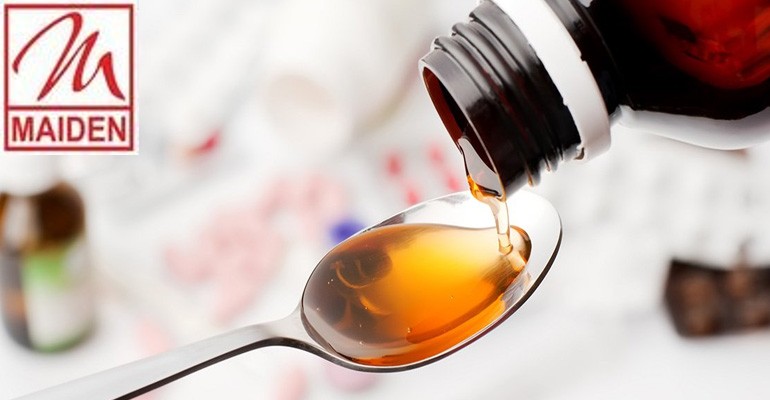
'Killer cough syrups' maker Maiden Pharma is a repeat offender in India

The World Health Organisation (WHO) recently issued an alert, saying four “contaminated” and “substandard” cough syrups produced by Maiden Pharmaceuticals Limited could be the reason for the deaths of 66 children in The Gambia, and the company is a repeat offender in India, and was banned by Vietnam in 2011.
The four products are Promethazine Oral Solution, Kofexmalin Baby Cough Syrup, Makoff Baby Cough Syrup and Magrip N Cold Syrup.
“To date, the stated manufacturer (Maiden Pharmaceuticals) has not provided guarantees to WHO on the safety and quality of these products,” WHO said in a statement.
Also read: All you need to know about cough syrups linked to deaths in Gambia
Maiden Pharma’s ‘WHO-GMP’ claim
On its website, Maiden Pharmaceuticals claims it is “one of the leading WHO-GMP Certified Formulations Company Manufacturers in India and brings the best quality products. The company carries more than 30 years of experience in the niche manufacturing of WHO-GMP Certified Formulations Company.”
It said it “gives the assurance of high-quality and purity. The strict quality control ensures that every batch of the drug brings a uniform standard.”
The company started on November 22, 1990, and has a manufacturing plant based in Kundli, Haryana and a corporate office in Delhi.
Despite claims of GMP (good manufacturing practices), Maiden Pharmaceuticals was under the scanner in Kerala, Gujarat, Jammu and Kashmir and Bihar for producing “poor quality medicines, according to a public health activist quoted in an NDTV report.
Also read: Cough syrups made by Maiden Pharma sent to CDL Kolkata for examination
“I found the company severely lacking in quality control. We do not have a regulatory system in India. We have a central regulator called Central Drugs Standard Control Organisation (CDSCO), but every state has its own regulator. During research, we found that the regulators in Kerala and Gujarat had said that Maiden Pharma’s medicines were of poor quality. The public procurement agency of Bihar had also blacklisted a syrup,” public health activist Dinesh Thakur told the news channel.
Four states raise issues
He questioned how the company was given permission despite its poor record.
“Vietnam had blacklisted many companies a few years back because of their poor quality, and this company was also included in it (in 2011). When it has such a record, how was it given permission? Export permission is only given by the central regulator. CDSCO’s website has its name on it. This company has removed its website. Some cases linked to the company’s Directors have also been found in court. All of this shows the condition of systems in place for medicines in the country,” he added.
According to the report, the Bihar government found the company’s Erythromycin stearate 125 mg syrup’s four batches to be of poor quality in 2008, and in 2011, Methylergometrine tablet was found to be fake.
Also read: India-made cough syrups deaths in Gambia: Drug regulator initiates probe
The company was banned in Vietnam from 2011 to 2013.
Some of the other issues raised against the company included Gujarat (2013): Macipro Tab (dissolution issues); Jammu and Kashmir (2020): Cyproheptadine Hydrochloride Syrup IP (substandard in quality); Kerala (2021): Metformin 1000 tablet (dissolution issue), Easiprin (did not meet IP standard), Metformin 500 mg (dissolution issue) and Maikal D tablet (poor quality), the report added.
Missing links
Meanwhile, an expert termed the deaths of children in the West African nation linked to the cough syrups as “alarming” and said there are some missing links that need to be “investigated”.
“The information from WHO that cough syrups manufactured by an Indian pharma company caused the death of 66 children due to the presence of ethylene glycol is alarming. There are, however, some missing links that need to be carefully ascertained and investigated,” said Professor YK Gupta, senior pharmacologist and vice chairman of the Standing National Committee on Medicines (SNCM).
Dr. Gupta said the first death suspected to be due to the same reason was noted in July.
The Drugs Controller General of India (DCGI) received a communication from WHO on September 29 and the Indian government and the drug regulator immediately swung into action. The letter was responded to instantly by seeking full details. Despite October 1 being a Sunday and October 2 being a national holiday, investigations were initiated, Dr. Gupta explained.
“It is important to understand here that only new drug approval is granted by DCGI whereas license for manufacture and sale is given by state drug controller. In this case, the license for manufacture and sale was given by the state drug controller. The company was licensed to export only to this one country and not in any other country or in the Indian domestic market,” he told PTI.
The other missing link is that of the 23 samples which were tested by WHO, ethylene glycol was found only in four samples, Dr Gupta said adding, “This is perplexing and needs clarification.”
‘Isolated incidence’
“Also, the importing country gets it tested as per defined standards or their pharmacopeia. It seems this was somehow missed,” he said.
Indian regulations are very robust and have a zero-tolerance policy in such matters. So one should not question the alertness of regulators, he said.
The Indian pharma sector is producing drugs and vaccines which are used throughout the world and they are known for quality, and people trust them, he stated.
“Such isolated incidence must be thoroughly investigated and action should be taken but they must not be generalised and allowed to cast a bad shadow on the entire drug manufacturer in India,” Dr Gupta added.


